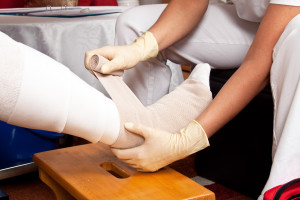 Millions of Americans suffer from non-healing, chronic wounds. Many wounds heal themselves in time but when standard medical care doesn’t solve the problem, the specialized wound care clinic at OakBend Medical Center may be the solution. Their clinic offers comprehensive care for patients with complex, chronic wounds. OakBend Medical Center uses a multidisciplinary approach to provide the most advanced healing options available including hyperbaric oxygen treatments. If you are seeking treatment for any of the chronic wounds below or any other non-healing wounds please call 281-633-4900.
Millions of Americans suffer from non-healing, chronic wounds. Many wounds heal themselves in time but when standard medical care doesn’t solve the problem, the specialized wound care clinic at OakBend Medical Center may be the solution. Their clinic offers comprehensive care for patients with complex, chronic wounds. OakBend Medical Center uses a multidisciplinary approach to provide the most advanced healing options available including hyperbaric oxygen treatments. If you are seeking treatment for any of the chronic wounds below or any other non-healing wounds please call 281-633-4900.
Types of chronic wounds
• Diabetic Foot Ulcers – The most common type of chronic wounds are diabetic foot ulcers. When diabetic ulcers are identified and treated early, the risk of debilitating or life-threatening complications can be dramatically reduced. Even with expert wound care, complete healing of diabetic ulcers occurs slowly in most patients, if at all. The risk of death from untreated diabetic foot ulcers is higher than prostate cancer and breast cancer combined. Nearly fifty percent of all non-healing diabetic ulcers result in death within five years of diagnosis.
• Venous Stasis Ulcers – Venous stasis ulcers can occur in the lower leg between the knee and ankle. If the valves in the veins that run through the legs don’t work they can cause the blood to pool in those veins. This pooling causes swelling which oftentimes leads to an ulcer. These ulcers are painful and can cause a lot of drainage. Treatment for venous stasis ulcers usually consists of compression wraps to help the blood get from the feet back to the heart.
• Arterial Ulcers – Arterial ulcers are caused by poor blood delivery to the lower extremities. Without blood, the overlying skin and tissues are killed due to a lack of oxygen. This results in an open wound. Arterial wounds usually occur on the tips of the toes or the outer ankle. The ideal treatment for arterial ulcers is to increase circulation to the area. This can be performed medically or surgically. When left untreated, arterial ulcers can lead to other serious complications including infection, and in extreme cases, amputation.
• Pressure Ulcers – Pressure ulcers, also called bedsores, are caused by prolonged lying or sitting in a single position for a long period of time. These ulcers usually develop on the hips, tailbone, ankles, shoulder blades, knees, elbows, heels, or the back of the head. Bed sores can be very painful and hard to treat. Treatment involves cleaning and dressing the wounds by a medical professional. It is also necessary to frequently change positions to increase circulation and reduce pressure on the wound(s).
• Gangrene – Gangrene is a rare condition that occurs when body tissue dies due to insufficient blood supply. Gangrene is treatable but requires urgent professional wound care including removing the affected tissues and taking prescribed antibiotics. In severe cases surgery or amputation may be required.
• Traumatic Ulcers – Injury or trauma to part of the body can cause a loss of skin and tissue layers resulting in a wound. Trauma can also damage the organs or compromise the blood, veins or lymphatic system, creating an ulcer. Treatments involve cleaning and dressing the wound and increasing circulation to the area.
• Post-Surgical Wounds – Unfortunately all surgeries come with the risk of infection. Post-surgical wounds are fairly common and symptoms include redness, intense or throbbing pain, swelling, discharge, or an unpleasant odor at the surgery site. These wounds show up within the first 30 days after a surgery. Treatment depends on the severity of the infection and generally involves a round of antibiotics while keeping the wound dressed. It is important to keep the area free of alcohol, cleansers or even antibacterial soap which can all damage the tissue and slow the healing.
Any wound that has not started to heal in a couple of weeks, or that has not completely healed after six weeks may require a visit to a specialized wound care clinic. Common wounds are easy to identify but can be very challenging to heal. For more information, please click here to see the wound care services pamphlet for OakBend Medical Center. To learn more about wound management services or to schedule an appointment please call 281-633-4900.
What is a Chronic Wound?
OakBend Medical Center © 2024 All rights reserved
